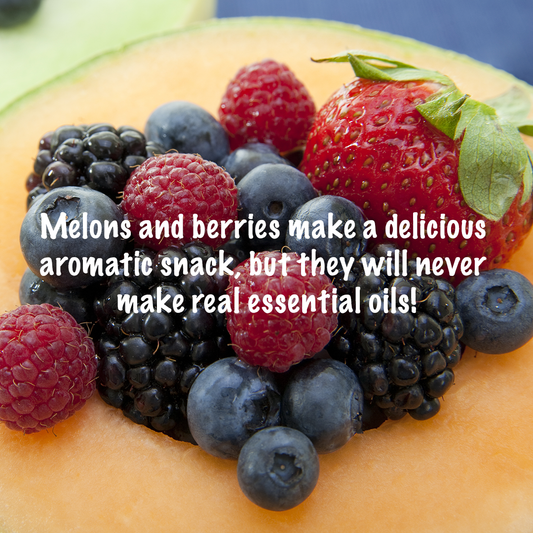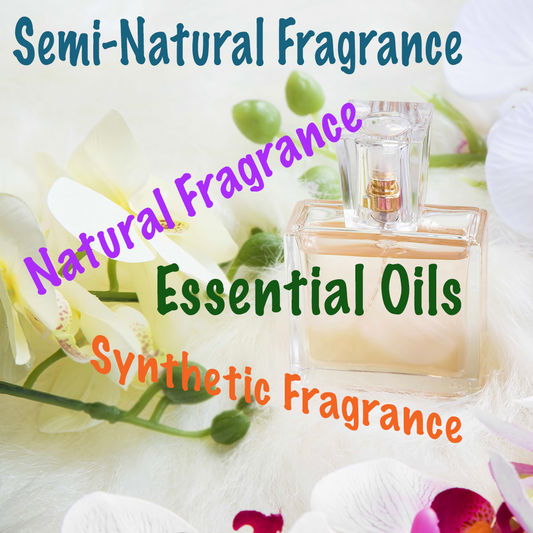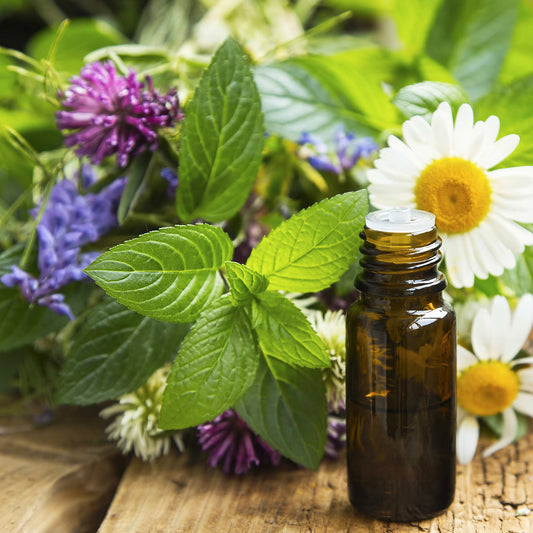What Are Essential Oils?
 If you have ever peeled an orange or enjoyed the scent of a lovely flower you have experienced the aromatic qualities of the essential oils--the true essence of the plant from which it was derived.
If you have ever peeled an orange or enjoyed the scent of a lovely flower you have experienced the aromatic qualities of the essential oils--the true essence of the plant from which it was derived.
The term "essential oils" may be confusing. Essential oils are not called that because they are a vital necessity (essential) for a healthy life.
The word “essential” refers to the fact that the oil contains the “essence” of the plant, the natural chemicals that provide its unique aroma or flavor.
Powerfully fragrant and concentrated, essential oils are pure natural aromatic extracts from a variety of aromatic plant materials.
Various oils come from different parts of the plant including grasses, leaves, flowers, needles, twigs, peels of fruit, seeds, bark, branches, and roots.
For example, rose essential oils are found in the flowers, in basil it is in the leaves, in citrus oils the fruit rind, in cinnamon the bark, in sandalwood the wood, and so on. It is interesting to note that Orange trees actually produce three very different types of essential oil: orange oil, from the peel; neroli oil, from the blossoms; and petitgrain oil from the leaves.
The oil is stored in tiny compartments, in or on the plant tissue. Essential oils are often called "volatile aromatic compounds." A volatile substance is one that easily evaporates at normal temperatures. When you first open a bottle of essential oil, you instantly notice that the aroma is not only strong but quickly moves throughout the air.
Thousands of varieties of these volatile aromatic compounds have been identified and they vary from plant to plant and even from species to species.The delicate balance of the aromatic compounds found in any given essential oil is what makes it unique, determines its aroma, and provides valuable psychological and physical aromatherapeutic benefits.
While most essential oils are steam distilled, citrus oils are cold-pressed from the fruit rinds.
The International Organization for Standardization (ISO) defines an essential oil as "a product made by distillation with either water or steam or by mechanical processing of citrus rinds or by dry distillation of natural materials." Following the distillation, the essential oil is physically separated from the water phase.
Contrary to the use of the word "oil," essential oils do not feel oily.
It is important to note that to be a true essential oil, the oil must be isolated from the plant material by physical means only. Essential oils are NEVER extracted using solvents.
Learn More Blog: How Essential Oils Are Extracted
Why Do Plants Produce Essential Oils?
 Essential oils are created in nature, by nature.
Essential oils are created in nature, by nature.
While I would love to believe that plants emit these beautiful scents just to make me feel good, I know that plant essential oils play an important role in the life of a plant for reproduction, communication, and protection.
Plants produce essential oils:
- To attract pollinators like bees and butterflies
- To protect themselves from microorganisms and fungi
- To protect their physical space
- To make themselves unpalatable to animals or insects and thereby protect themselves from being eaten (which is why many are great natural insect repellents)
Why Do People Use Essential Oils?
There have been volumes written about the uses of essential oils. They have been used for thousands of years for many things from medicine and health to religious and spiritual ceremonies.
Essential oils today are used for "perfume," natural skin and hair care, aromatherapy, household cleaning products, and healing therapy.
Because they are so concentrated, most essential oils should never be used undiluted, also called neat, on the skin. Instead, they should be combined with carrier oils like sweet almond oil, sunflower oil or olive oil.
The Scent of an Essential Oil Often Changes: They Are Made From Natural Plant Materials
We sometimes receive questions like, "I just got a new bar of Lavender Rosemary Soap and it smells different than the last one, is something wrong with it?"
Even with high-quality, pure, essential oils, the scent may vary. We rely on Mother Nature (not a laboratory) to perfect the scent of our fields of lavender and rosemary.
Mother Nature behaves a bit differently year after year. The exact chemical composition of essential oil compounds is influenced by many factors. The general weather and temperature, rainfall, geographic location, soil quality, time of day harvested, season, year grown, every step of the production process, and how they are packaged and stored are critical determinants of the overall quality of the essential oil product.
So one batch of lavender may have been harvested in southern France on a rainy, cool, June day and another batch from a hillside in Spain on a hot, August day, and although the scents may be a little different from each other, the lavender will still have the same great properties.
Each plant is unique in its chemistry so essential oils are never exactly the same which is quite different from synthetic scents which are reproduced to be identical every time.
Research on Essential Oils
Unfortunately, research on the effectiveness of the therapeutic use of essential oils is quite limited. However, some studies have shown that aromatherapy might have health benefits such as relief from anxiety and depression, improved sleep, and enhanced quality of life, especially for people with chronic health conditions.
One of the problems for essential researchers is that the chemical constituents in essential oils are influenced by external conditions. Each plant is unique in its chemistry so essential oils are never exactly the same-this is different from pharmaceutical drugs that are synthetically reproduced to be identical every time.
Why Are Essential Oils So Expensive?
 The methods used to extract pure essential oils are time-consuming, expensive, and require a high degree of expertise.
The methods used to extract pure essential oils are time-consuming, expensive, and require a high degree of expertise.
The most important factor is how much plant matter it takes to produce the essential oil.
Have you ever twisted a lemon or orange peel? The beads that pop up on the surface of the fruit’s skin are the essential oils of that fruit--what makes the zest so very flavorful.
Now think about the leaves or flowers of tiny plants like Thyme or Lavender. Or the delicate flowers of plants like jasmine and roses. How much oil can be produced by the leaves or flowers of those tiny plants?
Also, enormous amounts of plants are needed to produce essential oil. For example,
- to produce 1 pound of pure Lemon Balm (Melissa) it takes a few tons (yes tons) of plant material (Lemon Balm essential oil sells for $9,000-$15,000 per pound)
- to produce 1 pound of lavender essential oil it takes about 250 pounds of lavender flower
- to produce one ounce of lemon essential oil it takes about 100 lemons
Although synthetic fragrances or "nature identical" oils are available at a much lower cost, only natural plant essential oils will provide the botanical therapeutic benefits.
Essential oils also have an immediate impact on our sense of smell. Only natural botanical essential oils can cause various neurochemicals to be released in the brain, which can affect the body, mind, and spirit.
Real Essential Oils vs Isolates
If you see words like linalool, citronellol, eugenol, geraniol, or limonene listed on product packaging, these are isolates. Each essential oil contains hundreds of natural aromatic components called isolates, which are individual scent molecules that can be extracted from whole essential oils.
Some isolates are synthetic, meaning they are created in laboratories, while others are naturally extracted from plants or essential oils using methods like steam distillation and solvent extraction.
When you extract a pure essential oil, you obtain the entire complex scent compound. When you extract an isolate, you are isolating just one scent molecule. Many unrelated plants, such as oranges and eucalyptus, share common isolates, making it difficult to trace their origins. Unfortunately, you may never truly know how the isolate was made.
Essential oils are a synergy of hundreds of natural, therapeutic components. We believe that this complex blend is how nature intended it. When using isolates in place of whole essential oils, you are giving up the powerful, multifaceted therapeutic and aromatic benefits that essential oils provide.
So why do companies choose isolates over essential oils? Isolates allow them to:
- create consistent and more stable scent profiles
- improve cost-effectiveness
- ensure ease of use in fragrance formulation
- develop specific, unique, controlled aromas
Since essential oils are derived from natural plant materials that can vary due to environmental conditions, isolates help maintain uniformity in fragrance products. This is why the perfume industry has long relied on isolates—but now, they are infiltrating the world of “natural” skincare as well.
Here’s the problem: A skincare product marketed as “natural” may actually contain only isolates instead of real essential oils. This creates the illusion of natural purity, when in reality, the product lacks the full-spectrum benefits of true botanical ingredients.
Essential Oils are Not the Same as Perfume Oils or Fragrance Oils
Although synthetic, artificially created fragrances or "nature identical" oils are available at a much lower cost, they will not offer the therapeutic benefits that essential oils offer.
Learn More Blog: What Are Natural Fragrance Oils
Synthetic fragrance oils offer nothing but the scent. It is like the difference between drinking pure orange juice and orange-flavored water. Both can provide an orange flavor, but only the natural orange juice will provide the nutrition as well.
Essential oils have an immediate impact on our sense of smell. Only natural botanical essential oils can cause neurochemicals to be released in the brain, which can affect the body, mind, and spirit.
Buyer Beware!
Be sure you check out your essential oil supplier and buy from reputable dealers. Unfortunately, the ever-increasing demand has led to some unscrupulous suppliers selling "counterfeit" or adulterated essential oils.
There are companies that cut essential oils with carrier oils, isolates, or even synthetic fragrance oils.
Cheaper oils are also available from companies that use solvents to extract the oils. These oils do not meet the definition and should not be called "essential oils."
If a store or website is selling all of their essential oils for the same price this is a clear tip-off that you are not dealing with pure essential oils. For example, neroli essential oil can cost over $350 for a 1-ounce (30ml) bottle, while sweet orange essential oil may cost only $12.00 for an ounce.
We are often asked, "Why No Jasmine, Sandalwood, or Apple Scents?" When we use scents (essential oils), we look at a few criteria such as the method of extraction, sustainability, cost, and of course, only pure essential oils.
Learn More Blog: How We Decide What Scents Not to Use?
General Precautions When Using Essential Oils
 At Chagrin Valley Soap we have done painstaking research whenever essential oils are added to our products to ensure proper dilution and blending proportions.
At Chagrin Valley Soap we have done painstaking research whenever essential oils are added to our products to ensure proper dilution and blending proportions.
- There are many wonderful essential oils but YOU MUST do your research. Please remember that everything on the Internet is NOT always true. If you are unsure about proper usage check with a qualified specialist.
- The purpose of aromatherapy is to elicit some reaction in the body. Since we are all unique, not all oils will benefit everyone in the same manner.
- With few exceptions, you should NEVER apply essential oils directly to your skin. They should be diluted in a carrier oil.
- Essential oils are very strong and many can be skin irritants if not used correctly.
- To check for sensitivity or allergic reaction we suggest you perform a patch test using a properly diluted essential oil.
- Essential oils are for external use only. Never take essential oils internally unless working with a qualified and expert practitioner.
- Keep all essential oils out of the reach of children and pets.
-
Pregnancy: Always check with your Health Care Professional when using pure essential oils during pregnancy.
-
If you are under a doctor's care for any medical condition, please consult your Health Care provider before using essential oils.
- Chemical compounds in essential oils can produce adverse effects when combined with medications. They may reduce the effectiveness of conventional drugs, or they may exacerbate health conditions in the individual.
- While essential oils may help to soothe the symptoms of viruses such as flu, there is no evidence at this time to suggest that inhaling or applying essential oils to the skin can prevent viruses from entering the body to prevent infection in the first place.
Conclusion
Essential oils are plant extracts made by steaming or pressing various parts of a plant (flowers, bark, leaves or fruit) to capture the compounds that produce fragrance. It can take several pounds of a plant to produce a single bottle of essential oil. In addition to creating scent, essential oils perform other functions in plants.
Essential oils have been getting a lot of buzz recently for helping with everything from headaches to sleep problems. Although there is lots of anecdotal information concerning the use of essential oils as natural remedies for a number of ailments, there's not enough research to determine their effectiveness in human health.
The quality of essential oils on the market varies greatly, from pure essential oils to those diluted with less expensive and sometimes toxic ingredients. Since there is no regulation, a product label may not even list everything that's in the bottle you're buying. That's why essential oils should not be ingested.

Photosensitivity and Citrus Essential Oils
Why We Use Only Real Plant Essential Oils?
How Essential Oils Are Extracted
Essential Oil Basics: A Guide To Carrier Oils
Essential Oil Basics: A Guide To Dilution Rates
How to Diffuse Essential Oils for Personal Use
Why Are Synthetic Fragrance Oils So Popular?
Natural Fragrance Oil? . . . Really?
How To Do A Simple Allergy Patch Test
The information above pertains to healthy adults. We do not provide information on the safety of essential oils during pregnancy or for use in Children because the available information is often contradictory. If you are interested in using essential oils during pregnancy or with young children please do your own research and be sure to consult your doctor, midwife, or health care professional before use.
The statements regarding health-related benefits of essential oils have not been evaluated by the Food and Drug Administration and are in no way intended and should not be construed as medical advice to diagnose, treat, cure, or prevent any disease or health condition.









